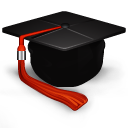Graduation and Retention
TRIO Training Website
21st Century Skills and Rigorous Academic Curriculum
How can we prepare students to benefit from and meet the challenges of the the 21st Century? How can students be engaged in learning that challenges and prepares them for the new collaborative, global, fast-paced world and for the unprecedented amount of information and resources at their fingertips?
Retention Applications from Neuroscience
Learn new, simple, low-cost techniques to improve all students' academic performance, retention, and graduation. Neuroscience has given to educators a foundation for the development of tools to enhance brain functioning, including students' performance on tests and the setting of ambitious academic and career goals.
Q&A With John N. Gardner
John N. Gardner, "an educator, university professor and administrator, author, editor, public speaker, consultant, change agent, student retention specialist, first-year students' advocate, and initiator and scholar of the American first-year and senior-year reform movements" answers questions on retention and graduation for TRIO.
Interview with Dr. Claude Steele
Transcript and audio of the UW TRIO Training interview with Professor Claude Steele.
Brain Research for Retention
Links to online resources on brain research for retention.
Online Training Short Subject Presentations with Audio
Please go to the Online Training page to learn how to access the following presentations.
 |
Improving Learning for TRIO Students Research to Improve Retention Improving Student Success |
 |
TRIO Student Retention |
Online Resources
College Reading and Learning Association - CRLA
"CRLA is a voluntary association of over 1200 postsecondary learning assistance colleagues. We are tutor trainers; faculty in various fields, such as reading, math, writing, education, and learning skills; learning center administrators; TRIO program personnel; developmental educators; and other academic support professionals who work primarily in Canada and the United States."
ED.gov: ERIC
"The Education Resources Information Center (ERIC), sponsored by the Institute of Education Sciences (IES) of the U.S. Department of Education, produces the world's premier database of journal and non-journal education literature. ERIC provides a public Web site for searching nearly 1.2 million citations going back to 1966 and, with contributor permission, accessing more than 110,000 full-text materials at no charge."
Frontline Interview with Dr. Claude Steele
"Steele and his colleagues have described what they call 'stereotype threat,' the idea that students who belong to groups that have been negatively stereotyped are likely to perform less well in situations such as standardized tests in which they feel they are being evaluated through the lens of that stereotype."
National Center for Education Statistics
"The National Center for Education Statistics (NCES), located within the U.S. Department of Education and the Institute of Education Sciences, is the primary federal entity for collecting and analyzing data related to education."
-
NCES: Freshman Graduation Rate for Public High Schools
"This report presents the averaged freshman graduation rate for public high school students for school years 2002-03 and 2003-04 based on data reported by state education agencies to the National Center for Education Statistics." -
NCES: Dropout Rates
"This report builds upon a series of National Center for Education Statistics (NCES) reports on high school dropout and completion rates that began in 1988. It presents estimates of rates for 2005, and provides data about trends in dropout and completion rates over the last three decades (1972-2005), including characteristics of dropouts and completers in these years. Among other findings, the report shows that in students living in low-income families were approximately six times more likely to drop out of high school between 2004 and 2005 than of their peers from high-income families." -
NCES: The Condition of Education
This website is an integrated collection of the indicators and analyses published in The Condition of Education 2000–2006
Center for Higher Education Policy Analysis
"The Center for Higher Education Policy Analysis (CHEPA) brings a multidisciplinary perspective to complex social, political, and economic issues in higher education."
- The Navigator Newsletter
- Getting There - and Beyond: Building a Culture of College-going in High Schools
The Chronicle of Higher Education: "Psychologists Discuss Papers on Factors Affecting Student Performance and Attitude"
This article presents recent research on stereotype threat in higher education.
Education Week Chats
Edweek.org's Online Chat is an open forum where readers can participate in a give-and-take discussion with a variety of guests.
- Helping African-American Boys
"Henry M. Levin, professor of economics and education at Columbia University, and Michael Holzman, lead consultant for the Schott Foundation initiative, discussed the best approaches for helping African-American boys succeed in school."
- A Closer look at Asian-American Achievement
A discussion with Don T. Nakanishi, director of the UCLA Asian-American Studies Center.
The Pell Institute for the Study of Opportunity in Higher Education
"The Pell Institute for the Study of Opportunity in Higher Education conducts and disseminates research and policy analysis to encourage policymakers, educators, and the public to improve educational opportunities and outcomes for low-income, first-generation, and disabled college students."
- Demography is not Destiny: Increasing the Graduation Rates of Low-Income College Students at Large Public Universities
- Straight from the Source: What Works for First-Generation College Students
The Policy Center on the First Year of College
"The Policy Center on the First Year of College has as its basic mission the improvement of the beginning college experience through enhanced learning, success, and retention of new students. This mission is grounded in the belief that an institution’s first-year policies and practices are the foundation for attainment of the larger goals of undergraduate education. The signature work of the Policy Center is the engagement of post secondary institutions in a model for voluntary, comprehensive self-study and development and implementation of an intentional action plan designed to enhance the effectiveness of the first year."
Common Core State Standards Initiative
"These standards define the knowledge and skills students should have within their K-12 education careers so that they will graduate high school able to succeed in entry-level, credit-bearing academic college courses and in workforce training programs."
Postsecondary Education Opportunity
"This research letter is founded on two fundamental beliefs. First, sound public social policy requires accurate, current, independent, and focused information on the human condition. Second, education is essential to the development of human potential and resources for both private and public benefit. Therefore, the purpose of this research letter is to inform those who formulate, fund, and administer public policy and programs about the condition of and influences that affect postsecondary education opportunity for all Americans."
Wisconsin Center for the Advancement of Post secondary Education
"Research and instruction programs at WISCAPE are designed to enhance post secondary education leadership by exploring the complex organizational structures and cultures that characterize post secondary education, and the relationship among institutional cultures, constituencies, and leadership."
